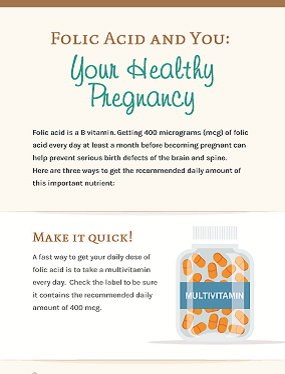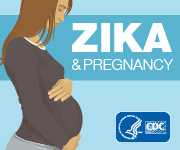During Pregnancy
Congratulations, you’re pregnant! Pregnancy is an exciting time, but it can also be stressful. Knowing that you are doing all you can to stay healthy during pregnancy and give your baby a healthy start in life will help you to have peace of mind.
Preventing Problems
Premature Birth: Important growth and development occur throughout pregnancy – all the way through the final months and weeks. Babies born three or more weeks earlier than their due date have greater risk of serious disability or even death. Learn the warning signs and how to prevent a premature birth.

Folic Acid: Folic acid is a B vitamin that can help prevent major birth defects. Take a vitamin with 400 micrograms (mcg) of folic acid every day, before and during pregnancy.
Smoking during pregnancy is the single most preventable cause of illness and death among mothers and infants. Learn more about the dangers of smoking and find help to quit.
Alcohol: When you drink alcohol, so does your unborn baby. There is no known safe amount of alcohol to drink while pregnant.
Vaccinations: Vaccines help protect you and your baby against serious diseases. CDC recommends you get a whooping cough and flu vaccine during each pregnancy to help protect yourself and your developing baby. Talk to your ob-gyn or midwife about including vaccines as part of a healthy pregnancy.
Infections: You won’t always know if you have an infection—sometimes you won’t even feel sick. Learn how to help prevent infections that could harm your unborn baby.
HIV: If you are pregnant or are thinking about becoming pregnant, get a test for HIV as soon as possible and encourage your partner to get tested as well. If you have HIV and you are pregnant, there is a lot you can do to keep yourself healthy and not give HIV to your baby.
West Nile Virus: Take steps to reduce your risk for West Nile virus and other mosquito-borne infections.
Diabetes: Poor control of diabetes during pregnancy increases the chance for birth defects and other problems for your baby. It can cause serious complications for you, too.
High Blood Pressure: Existing high blood pressure can increase your risk of problems during pregnancy.
Medications: Taking certain medications during pregnancy might cause serious birth defects for your baby. Talk to your doctor or pharmacist about any medications you are taking. These include prescription and over-the-counter medications and dietary or herbal supplements.
Depression: Depression is common and treatable. If you think you have depression, seek treatment from your health care provider as soon as possible.
Environmental and Workplace Exposures: Some workplace hazards can affect the health of your unborn baby. Learn how to prevent certain workplace hazards. Learn about specific chemicals.
Unborn Babies Exposed to Radiation: If you think you might have been exposed to radiation, talk with your doctor. Top of Page
Genetics and Family History
Genetics: Understanding genetic factors and genetic disorders is important for learning more about preventing birth defects, developmental disabilities, and other unique conditions in children.
Family History: Family members share their genes and their environment, lifestyles, and habits. A family history can help identify possible disease risks for you and your baby.
Genetic Counselor: Your doctor might suggest that you see a genetic counselor if you have a family history of a genetic condition or have had several miscarriages or infant deaths. Top of Page
Other Concerns
Bleeding and Clotting Disorders: Bleeding and clotting disorders can cause serious problems during pregnancy, including miscarriage. If you have a bleeding or clotting disorder, talk with your doctor.
Natural Disasters: A natural disaster like a hurricane or tornado is devastating for anyone affected, but pregnant women often have special concerns. Learn more about infections, medications, vaccinations, and toxins that might be related to natural disasters.
Travel: If you are planning a trip within the country or internationally, talk to your doctor first. Travel might cause problems during pregnancy. Also, find out about the quality of medical care at your destination and during transit.
Violence and Pregnancy: Violence can lead to injury and death among women in any stage of life, including during pregnancy. Learn more about violence against women, and find out where to get help. Top of Page
Things to Think About Before Baby Arrives
Breastfeeding: You and your baby gain many benefits from breastfeeding. Breast milk is easy to digest and has antibodies that can protect your baby from bacterial and viral infections.
Jaundice and Kernicterus: Jaundice can sometimes lead to brain damage in newborns. Before leaving the hospital, ask your doctor or nurse about a jaundice bilirubin test. If you think your baby has jaundice, call and visit your baby’s doctor right away.
Newborn Screening: Within 48 hours of your baby’s birth, a sample of blood is taken from a “heel stick,” and the blood is tested for treatable diseases. More than 98% of all children born in the United States are tested for these disorders.
Sudden Infant Death Syndrome (SIDS): SIDS is the sudden death of an infant younger than 1 year of age that cannot be explained. Learn how to help your baby stay safe.
Child Safety Seats: Motor vehicle crashes are the leading cause of death among children in the United States. But many of these deaths can be prevented. Placing your baby in age- and size-appropriate restraint system lowers the risk of serious and fatal injuries by more than half. Top of Page
- Page last reviewed: October 10, 2017
- Page last updated: October 10, 2017
- Content source:




 ShareCompartir
ShareCompartir